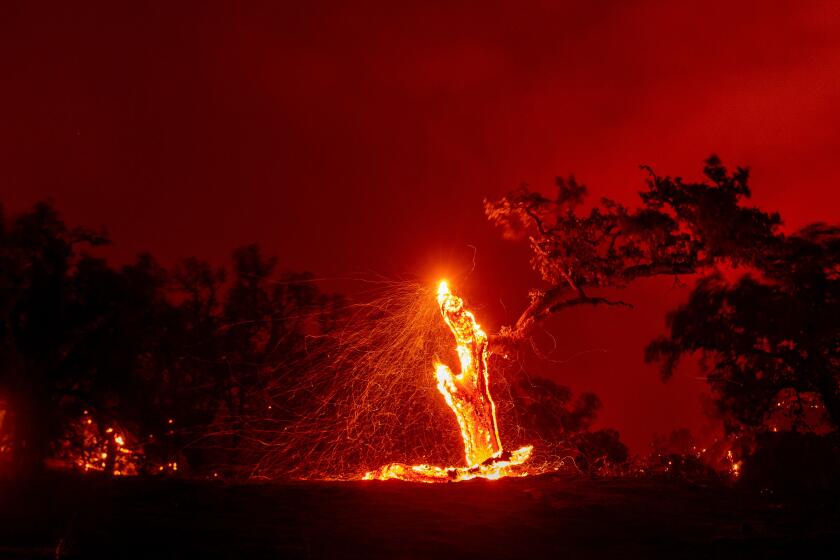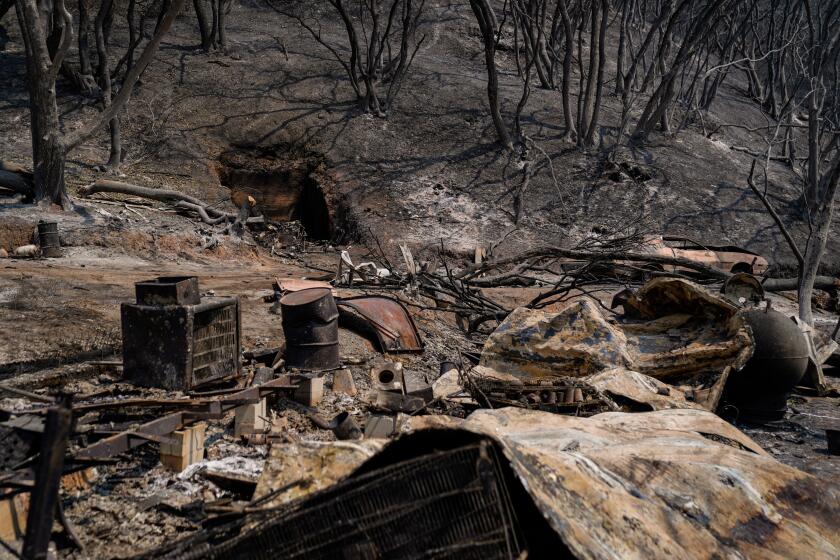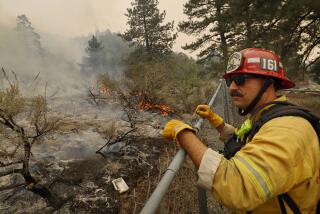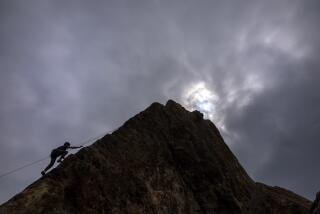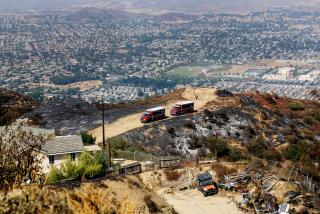California firestorm could claim more than 3,000 homes and structures
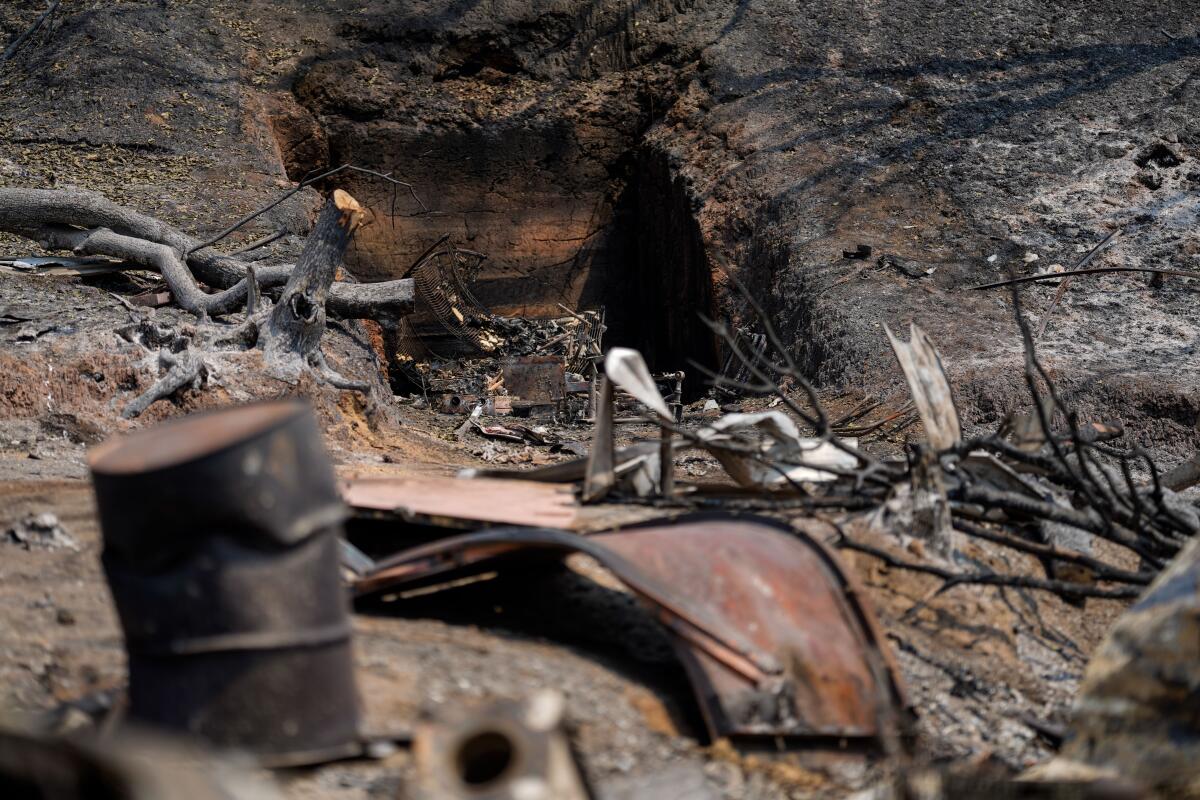
SAN FRANCISCO — Nearly 2,000 structures have been destroyed by the historic fires sweeping across Northern California, but officials say that number could almost double before the blazes are extinguished.
Crews are now going through the many fire zones conducting an assessment of burned structures, said Daniel Berlant, a spokesman for the California Department of Forestry and Fire Protection, noting that this is possible because of significant progress on the front lines over the last two days.
The count of destroyed structures is ongoing, and the department’s “preliminary assessments indicate that number could rise in total to over 3,000,” Berlant said in a briefing Tuesday.
“We are busy trying to get that information and provide it to the public,” he added.
Santa Cruz County has released an online map so residents can see whether their homes have been damaged. But officials cautioned that the assessment is ongoing, so the map may not be current.
Northern California wildfires rage through the region with possible more on the way
Here is a partial breakdown of the losses:
- 978 structures destroyed in the LNU Lightning Complex fire (wine country)
- 538 destroyed in the CZU Lightning Complex fire (San Mateo-Santa Cruz)
- 73 destroyed in the Carmel fire (Monterey County)
- 37 destroyed in the SCU Lightning Complex fire (Santa Clara County/east of San Jose and west of Central Valley)
- 30 destroyed in the River fire (Monterey County)
- 21 destroyed in the Jones fire (Nevada County)
Since Aug. 15 — which marked the beginning of a “lightning siege” that has seen almost 14,000 lightning strikes statewide — crews have contended with more than 700 new wildfires that have charred more than 1.3 million acres.
However, despite the devastation, officials are continuing to report promising progress in battles against the firestorm.
“All of the firefighters are continuing to make very good progress, though it has been a grueling couple of weeks,” Berlant said Wednesday.
Gov. Gavin Newsom added Wednesday that the state is “putting every single asset we possibly can, deploying every conceivable resource to battle these historic wildfires.”
Though containment of some of the largest blazes burning across the state has improved, crews are being kept busy responding to new fires. In the 24-hour period ending early Wednesday afternoon, Newsom said there were 423 additional lightning strikes throughout the state and 50 newly reported fires.
“As of an hour or so ago, they have been effectively suppressed, all 50 of those new fires, but it gives you a sense of the magnitude and scope of what these incredible leaders, these incredible front-line heroes, are doing every single day,” Newsom said shortly after noon.
Containment of the CZU Lightning Complex fire, which has burned more than 81,000 acres, now stands at 21%. Almost 600 structures have been destroyed, the majority in Santa Cruz County, and more than 24,000 structures remain threatened.
Newsom said this particular conflagration “has generated a lot of stress, for no other reason than, in recorded history, we’ve never seen a fire this size and scope in this region of the state.”
Cal Fire Operations Chief Mark Brunton said Wednesday evening that firefighters are continuing to make progress on the fire.
“We had another good, successful day of suppression on the fire,” he said.
Crews are continuing to build containment lines around the flames, and plan to do a controlled burn to create a protective barrier around the community of Felton.
“That will then button up that part of the fire above Felton, so that is excellent news,” Cal Fire Operations Chief Mark Brunton said earlier Wednesday. “It’s going to take a couple days once we do that to continue to mop up, take out the hot spots and then render that safe.”
On Tuesday afternoon, authorities lifted all evacuation warnings in Santa Clara County. On Wednesday evening, evacuation orders for UC Santa Cruz were retracted.
University officials said on Twitter that parts of the campus remain without power and that “reopening the residential campus will be deliberate & phased.” Employees who live in certain areas on campus will be able to return to their homes Wednesday night.
Crews also plan to soon restore power to the community of Davenport, Brunton said.
Santa Cruz County Sheriff’s Chief Deputy Chris Clark said that the repopulation of Scotts Valley could happen “within the next day or days” and the area around the city of Felton might also be repopulated within days. The repopulation of other areas that have seen heavier damage, like the town of Bonny Doon, could take weeks.
Three people are still missing in the area of the CZU Lightning Complex. Clark said officials don’t believe that they were victims of the fire but cannot confirm for certain.
On Tuesday night, deputies also found a 63-year-old woman dead in her home in Felton. It appears she died of natural causes, Clark said.
The SCU Lightning Complex fire — which at more than 367,000 acres ranks as the second-largest in California history — was 30% contained as of Wednesday evening.
In a press conference, Cal Fire Operations Section Chief Tim Ernst said that he doesn’t expect to see growth on the east side of the fire and that the blaze is moving very slowly on its southern end. However, he warned that firefighters cannot guarantee the safety of the civilians within the fire’s perimeter.
“Even though we have containment on the outside, we have a lot of hazardous area on the inside,” he said. “We still have a potential for danger to people who might want to travel within that perimeter.”
Authorities on Wednesday downgraded an evacuation order issued amid a fire in Stanislaus County to a warning.
The third-largest fire in state history, the LNU Lightning Complex, has charred 360,000 acres and was 33% contained as of Wednesday evening. In the afternoon, officials reduced an evacuation order in Napa County to a warning. Later in the evening, however, they issued a new evacuation order for Yolo County and evacuation warnings for parts of Yolo and Lake counties.
“I assure you that every resource available to us is working tirelessly and as hard as they can to ensure your safety and get you home as quickly as possible,” Cal Fire Unit Chief Shana Jones said during a briefing.
This family had a fire bunker and plentiful water. But a pair of LNU complex fires converged and overran their escape. Relatives see it as a lesson for others.
While continued progress in containment of the widespread wildfires is encouraging, the blazes have taken a dramatic toll — and not just in terms of acres burned.
More than 136,000 people across the state have been evacuated from their homes, officials said Tuesday.
There have been seven fire-related fatalities, including five people who died in the LNU Lightning Complex fire — three in Napa County and two in Solano County — and one in the CZU Lightning Complex fire. A pilot also died in a helicopter crash in Fresno County while on a water-dropping mission for the Hills fire.
However, officials said the hard work of front-line firefighters, with an assist from Mother Nature in the form of cooperative weather, is making a significant difference.
“This weather pattern is fantastic,” Brunton said, as increased humidity and fuel moisture levels have allowed crews to get a better handle on the CZU Lightning Complex fire.
Lin reported from San Francisco and Money and Miller from Los Angeles.
More to Read
Sign up for Essential California
The most important California stories and recommendations in your inbox every morning.
You may occasionally receive promotional content from the Los Angeles Times.
